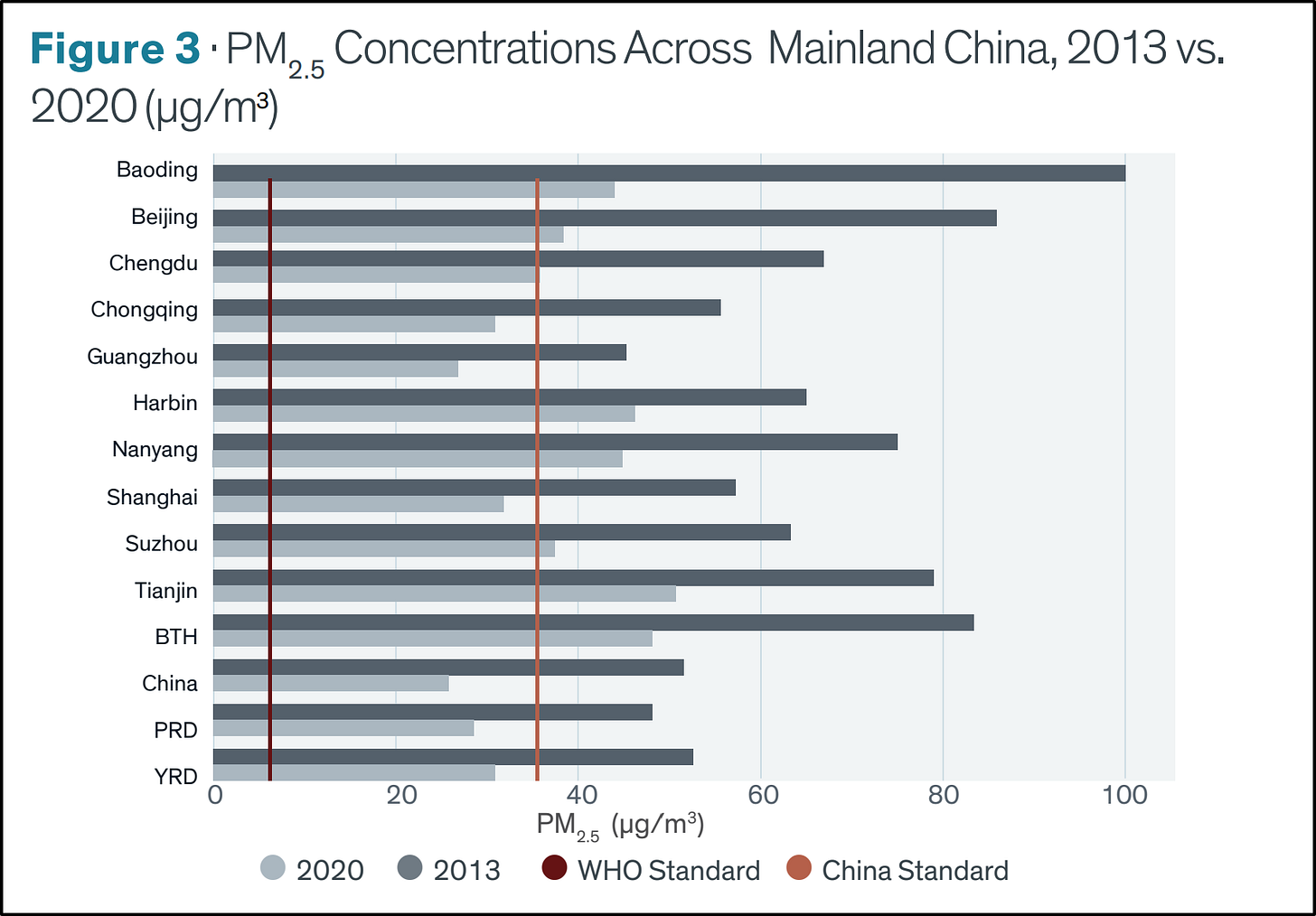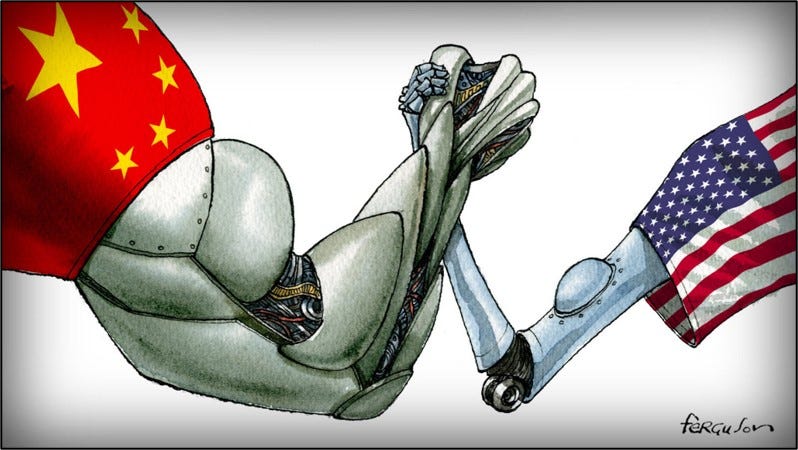Potemkin Olympics: Behold Beijing's Beautiful Blue Skies
the Plug #27 | On Pollution and Emissions
"They muddy the water to make it seem deep." - Friedrich Nietzsche
The Ancient Greeks began the Olympic Tradition as a means by which to honour Zeus, the Greek god of the sky. In the ensuing millennia, the event’s pious intentions have slowly been overwhelmed by secularity.
The Olympic Games are now an international celebration of human achievement and triumph.
This year, for the second time in fourteen years, the Olympics are taking place in China. Thousands of athletes from around the world have converged on Beijing to compete on the world's biggest stage, crystallizing what were once just hopeful childhood dreams. Millions of fans from each of the world’s seven continents will tune in at some point during the event to celebrate the achievements of their compatriots.
For this year's host nation, the Beijing Olympics are an opportunity to boast its domestic beauty.
I’ve now been alive to see the event fourteen different times. But this year, for the first time in my life, I'm seeing the sixteen-day sporting event through a new lens. Without rose-tinted glasses. The Olympics are more than just a sporting event. Instead, the event is an opportunity to manufacture an ostentatious display of industrialized grandeur in the shape of stadiums, podiums, and shiny new infrastructure. For me, the Beijing Olympics symbolize human’s mastery of our environment.
Undoubtedly, like every host nation before it, China is overwhelmingly focused on putting its best foot forward. Determined to create a perception of peace, prosperity, and unity, as millions of eyeballs tune into the games to watch the best of the best compete at the highest level in their sport.
Chinese ambition, however, extends well beyond Olympic glory.
Since Beijing last hosted the Olympics in 2008, China's geopolitical influence has continued to grow. Today, it rivals that of the United States.
China’s highly manicured presentation will facilitate the continued expansion of the country’s international reach and influence. For the next ten days, China's hair will be neatly combed, its lipstick meticulously applied, and its fingernails painted bright red. Maintaining this illusion of perfectionism is paramount for Chinese leaders; directed at those tuning in from around the world and also its citizens domestically.
And so, this piece starts with a warning.
Don't be fooled by the Olympic-blue skies on display during the next ten days. Nor by the foliage and greenery that gives the impression of a perfect coexistence between nature and humankind.
This impression is as dubious and artificial as gas station sushi.
🍑Russian Sex in the City
To properly understand the Beijing Olympics facade, it's worth first taking a trip back to 18th century Russia. The lessons from this long-forgotten love affair are foundational in the art of deceit.
Grigory Potyomkin was born in Russia in 1739. His illustrious career was built upon his prowess on the battlefield as a military leader. But, most importantly for this story, he was also a close affiliate and part-time lover to Catherine the Great, the last reigning Empress Regnant of Russia.

In 1783, Grigory and his troops celebrated the peaceful annexation of Crimea. The victory facilitated a bolt-on acquisition for the Russian Empire. Seemingly, this event was in stark contrast to the not-so-peaceful annexation of Crimea, which occurred more recently in 2014.
As the legend goes, Grigory was determined to show off his newly acquired crown jewel and impress his girlfriend. And so, a few months later, the Russian Empress set off from Moscow to tour the freshly acquired Southern territory.
But Grigory wasn't content with the state of Crimea at the time. And so, he employed the assistance of a deceptive trick, the 18th century equivalent of fake news.
As the legend goes, Potyomkin had pasteboard facades installed at a distance from the riverbed to present the illusion of wealthy towns. He also ordered the mass mobilization of Crimean farmers and serfs, moved around the countryside and dressed up in fanciful garb.
He intended to create a perception of plenty and prosperity, a stark contrast to the Crimean reality. From this story was born a new term, coined in Grigory's honour.
A "Potemkin village" is an artificial and deceptive construct intended to deceive the population internally and those attempting to peer in from the outside.
Even more simply, it's a situation where perception does not match reality.
💩Biological Disinformation
There is no better example of a modern-day Potemkin village than Pyongyang, North Korea.
In his 2014 film The Interview, British Columbia native Seth Rogan set off for North Korea to interview Kim Jong-Un. The movie lays bare the malevolent deception orchestrated by North Korean leadership.
My favourite example of this phenomenon takes place shortly after Rogan arrives in Pyongyang. The scene unfolds in the back of a limousine and features a high-ranking military official insisting undoubtedly that Kim Jong Un does not have a butthole.
Instead, she asserts, "He works so hard he burns the energy from inside."

This scene is notable because this questionable take on human biology may seem comically absurd to anyone living in a developed country. A quick Google search could quickly disprove this claim of anatomical superiority. But for those in North Korea, in the absence of access to the outside world, such a claim may not be as outrageous as you may think.
As John Mayer once famously wrote: "when you control the information, you can tell them what you want." Including that your holiness does not have a butthole.
Thanks to information technology's propagation and cost declines, the world is more transparent than ever before. Which makes it all the more challenging to successfully orchestrate the type of large-scale deceit for which Potyomkin is now infamous.
And yet, even to this day, our eyes and our brains continue to fail us when presented with the simplest of optical illusions.
🚭China's Hazy Potemkin Olympics
In 2007, China was busy preparing for its first Olympic dinner party.
But Chinese leadership faced a monumental challenge: what to do about the air pollution that so visibly obstructed China's domestic beauty?
The ensuing effort undertaken by Chinese leadership has subsequently been described as the most extensive attempt at air quality control in human history. As the Olympics grew near, China pulled out all the stops:
Mandating the installation of emission-decreasing devices on all coal-fired electricity generation plants
Building new public transportation infrastructure to minimize the use of high-emitting vehicles
Shutting down certain Beijing-based chemical plants entirely
Implementing new gasoline taxes to discourage consumers from using their cars
.
More rigorous restrictions were also implemented throughout the 16-day Olympic event.
The outcome was beautiful, blue skies over Beijing!

The pollution control measures placed into action before and during the Olympics had an immediate impact on the country’s air quality. It also massively benefited the health of Chinese citizens.
A study conducted after the Olympics estimated that the pollution controls prevented ~196,000 premature deaths. And, using the somewhat dubious concept of Economic Value of Individual Life, the study estimated that the resulting benefit to China's economy was somewhere in the range of $58bn to $1 trillion per year.
Sadly, as the athletes packed their bags to go home and the eyes of the world returned to regularly scheduled programming, China slipped back into its old habits. Air pollution once again continued along its upwards trajectory unabated by restriction.
In 2013, as Chinese air quality reached its lowest point in history, the country’s leadership decided it was time to develop a longer-term pollution mitigation strategy. The Chinese government initiated the National Air Quality Action Plan that same year. The plan laid out a series of specific targets to drastically improve air quality by the end of 2017.
To China's credit, its "war against pollution" has shown a persistent and tangible impact. A recently published report produced by the Air Quality Life Index described the country's progress as "remarkable."

Thanks to the subsequent reduction in air pollution, residents of Beijing can now expect to live 3.7 and 4.6 years longer than they could have in 2008 and 2013, respectively.
But better and good are not mutually exclusive.
Today, despite the massive reductions in Chinese pollution, the concentration of PM 2.5 in Beijing's skies is still three times greater than in Los Angeles; a city that was once known as the smog capital of the world. And, throughout major Chinese cities, PM 2.5 concentration remains well above the standard set out by the World Health Organization.
China does, however, deserve credit for its pollution reduction efforts to date.
🫁Drowning in Air
Unfortunately, PM 2.5 and greenhouse gas (GHG) emissions are not the same.
PM 2.5 is a fine particulate matter emitted during the combustion of carbon-intensive commodities (oil, coal, wood, etc.). It's generated by motor vehicles, smelters, power plants, industrial facilities, residential fireplaces and wood stoves, agricultural burning and forest fires.
While China has significantly improved domestic air quality, its GHG emissions continue to grow at a troublesome rate. In early 2020, as the COVID pandemic took hold in China, a wide-scale economic shutdown was implemented.
Chinese GHG emissions began to plummet.
NASA's satellite imagery depicts the astounding change in Chinese emissions (specifically Nitrogen Dioxide) from January through February 2020.
You can watch a video of the same phenomenon here.

Sadly, the technology for capturing GHG emissions has not yet caught up to its particulate matter equivalent. The cost of negative emission technologies, including carbon capture, remains economically unfeasible on a large scale.
And so, absent the shutdown of China's economy, it would be foolish to hold our breaths in anticipation of a rapid decline in Chinese GHG emissions.
That is until the technology improves to the point where it's economically feasible.
🍎International Fruit Stands
I've stressed before that any attempt to compare China and the United States will be imperfect in nature. Due to several factors, most obviously the gross discrepancy in population size and differing styles of government, the U.S. is an apple while China is an orange.
But compare them anyways, I will!
The air pollution that currently plagues Chinese citizens was once also a problem for Americans. Can you guess which country was more effective in addressing the challenge?

China's recent success in tackling domestic air pollution is awe-inspiring when placed into a global context.
The United States set off on its war against air pollution in the early 1970s. In April of 1970, motivated by abysmal air quality, millions of Americans marched in solidarity on what would become the first Earth Day. Months later, the U.S. Environmental Protection Agency (EPA) was established, and Congress passed the Clean Air Act.
It took the Americans several decades and multiple recessions to achieve the same pollution reduction that China has accomplished in seven years.
China's success in addressing this challenge is thanks in no small part to its command-and-control model of government, which is uniquely adept at tackling large-scale, long-term problems. That is particularly true when compared to the American flavour of government, which I like to refer to as a stop-and-start democracy.
Unlike the U.S., Chinese leadership can mandate the closure of coal-fired power plants, even when an operational replacement is not yet ready. The outcome of such a decision is that citizens are left indefinitely without electricity access.
On a cold winter day, this would be particularly problematic.
The scenario I've just described took place in the lead-up to the 2017 emission targets. And, undoubtedly, Chinese citizens died as a result of the unforeseen electricity outages.
It is, however, worth noting that Americans also died in Texas in 2021, amidst wide-scale grid failure. Although in the U.S., I believe the scenario was mainly the product of negligence, not malevolence.
Like I said, apples and oranges.
🪨Throwing Rocks from Glass Houses
What you likely won't see on your TV this week is any evidence of China's attempts to manipulate its environment. But, out of sight, such actions will be taking place in full force.
In the lead-up to the Olympic games, snow machines have been busy turning millions of gallons of water into fake snow. And in the past three months, at least 250 rockets have been fired into the clouds over Zhangjiakou via cloud-seeding aircraft to manipulate the weather.
According to a recent WaPo article, the Beijing Weather Modification Office has historically been tasked with firing rockets to negate sandstorms, reduce hailstorms and relieve drought.
I find these weather manipulation tactics both incredibly interesting and exceedingly terrifying.
The 2022 Olympics are but the latest example of the battle that has been raging between humankind and mother nature since the dawn of humanity. This battle seems to increasingly involve humankind bending the environment to our will and creating a façade of control in the process.
Chinese leadership may be guilty of this crime against nature. But, on a slightly smaller scale, so too are you and I. More than ever before, I believe we are all living in the shadows of a Potemkin village.
I'm growing increasingly frustrated by the media environment in which we live. Ours is a world where motivational political rhetoric and optimistic social media feeds bear little resemblance to the actions taken daily to mitigate the worst impacts of climate change.
It might be easy to put lipstick on a pig. It's much harder to stop that pig from returning to its trough and rolling happily in the mud where it belongs.
The same is true of the fleeting deception that's taking place right before our eyes.
Pointing fingers is easy. So too is placing the blame for this global problem on the shoulders of our adversaries. But the uncomfortable reality is that international cooperation is more critical than ever before. Without it, our efforts to address the issues we "care about" - climate change, energy poverty, race and gender equality and pollution - will result in sweet productive nothing.
As I said initially, the Olympics are an international celebration of human achievement and triumph — a time when the world comes together despite our divisions and differences.
Maybe we need an Olympics for climate change?
I would bet that Zeus, whose home is increasingly being smoked out by human pollution and emissions, would support this motion.




